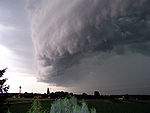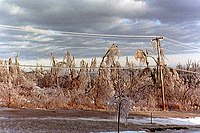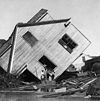The weather portal
Weather is the state of the atmosphere, describing for example the degree to which it is hot or cold, wet or dry, calm or stormy, clear or cloudy. On Earth, most weather phenomena occur in the lowest layer of the planet's atmosphere, the troposphere, just below the stratosphere. Weather refers to day-to-day temperature, precipitation, and other atmospheric conditions, whereas climate is the term for the averaging of atmospheric conditions over longer periods of time. When used without qualification, "weather" is generally understood to mean the weather of Earth.
Weather is driven by air pressure, temperature, and moisture differences between one place and another. These differences can occur due to the Sun's angle at any particular spot, which varies with latitude. The strong temperature contrast between polar and tropical air gives rise to the largest scale atmospheric circulations: the Hadley cell, the Ferrel cell, the polar cell, and the jet stream. Weather systems in the middle latitudes, such as extratropical cyclones, are caused by instabilities of the jet streamflow. Because Earth's axis is tilted relative to its orbital plane (called the ecliptic), sunlight is incident at different angles at different times of the year. On Earth's surface, temperatures usually range ±40 °C (−40 °F to 104 °F) annually. Over thousands of years, changes in Earth's orbit can affect the amount and distribution of solar energy received by Earth, thus influencing long-term climate and global climate change.
Surface temperature differences in turn cause pressure differences. Higher altitudes are cooler than lower altitudes, as most atmospheric heating is due to contact with the Earth's surface while radiative losses to space are mostly constant. Weather forecasting is the application of science and technology to predict the state of the atmosphere for a future time and a given location. Earth's weather system is a chaotic system; as a result, small changes to one part of the system can grow to have large effects on the system as a whole. Human attempts to control the weather have occurred throughout history, and there is evidence that human activities such as agriculture and industry have modified weather patterns.
Studying how the weather works on other planets has been helpful in understanding how weather works on Earth. A famous landmark in the Solar System, Jupiter's Great Red Spot, is an anticyclonic storm known to have existed for at least 300 years. However, the weather is not limited to planetary bodies. A star's corona is constantly being lost to space, creating what is essentially a very thin atmosphere throughout the Solar System. The movement of mass ejected from the Sun is known as the solar wind. (Full article...)
Selected article
The Ice Storm of 1998 (also known as Ice Storm '98) was a massive ice storm that struck areas of Eastern Ontario, southern Québec, and Nova Scotia in Canada, and bordering areas from Northern New York to Northern Maine in the United States. From January 4-10, 1998, up to 5 inches (120 mm) of ice accumulated on surfaces in these areas due to an unusually long period of freezing rain. The tremendous weight of ice accretion caused massive damage to trees and electrical infrastructure all over the area, leading to widespread power outages. Millions were left without power for periods varying from days to weeks, leading to more than 30 fatalities, a shut down of activities in large cities like Montreal and Ottawa, and an unprecedented reconstruction of the power grid. More than $5 million in damages were attributed to this storm.
Did you know (auto-generated) -

- ... that the weather forecast for HD 189733 b is "Westerly winds at 2000 m/s, with molten glass showers"?
- ... that an attempted British-Norwegian attack on the German battleship Tirpitz was abandoned after two Chariot manned torpedoes were lost due to bad weather?
- ... that Japanese actor Kouhei Higuchi prepared for his role on the television drama adaptation of My Personal Weatherman by learning from a weather forecaster?
- ... that extreme event attribution estimates how much climate change causes weather events, such as the 2021 Western North America heat wave?
- ... that after Irish post office clerk Maureen Flavin Sweeney reported worsening weather conditions, Dwight D. Eisenhower agreed to postpone D-Day by 24 hours?
- ... that in the 1980s, "Sherman Bonner, The Human Thermometer" presented the weather on an Arkansas TV station?
Selected image

Virga is precipitation which evaporates before reaching the ground, forming a translucent, wispy cloud. It can be seen descending from the dark foreground clouds over the London skyline in this May, 2007 photograph.
Recently selected pictures: Hurricane Isabel satellite, Hurricane Katrina Eye, Lightning strike near Swifts Creek, Victoria, Australia, More...
More did you know...
...that the Flying river is the name given to the transport of water vapor from the Amazon rainforest to southern Brazil?
...that hurricane shutters are required for all homes in Florida unless impact-resistant glass is used?
...that the Joint Institute for Marine and Atmospheric Research is a combined weather and ocean research institute with the cooperation of the Office of Oceanic and Atmospheric Research and the University of Hawaiʻi?
...that the SS Central America was sunk by a hurricane while carrying more than 30,000 pounds (13,600 kg) of gold, contributing to the Panic of 1857?
...that a hurricane force wind warning is issued by the United States National Weather Service for storms that are not tropical cyclones but are expected to produce hurricane-force winds (65 knots (75 mph; 120 km/h) or higher)?
...that the Automated Tropical Cyclone Forecasting System is a software package for tropical cyclone forecasting developed in 1988 that is still used today by meteorologists in various branches of the US Government?
Recent and ongoing weather
- Wikinews weather portal
- March 26, 2021: Tropical moisture ceases to cause severe floods in South East Australia
- February 19, 2021: Winter storms hammer Texas, fatalities reported
- December 28, 2021: Typhoon Phanfone strikes Philippines
- February 1, 2022: Deadly floods in Brazil after heavy rainfall
- April 15, 2022: South African floods kill at least 300 people
- Weather of 2024
- 2024 Atlantic hurricane season
- 2020–21 North American winter
- 2024 Pacific typhoon season
- Tornadoes of 2024
This week in weather history...
June 13
2006: The North American Mesoscale Model officially replaced the obsolete Eta model for mesoscale numerical weather prediction in the United States.
June 14
1903: A major flash flood destroyed a large portion of the town of Heppner, Oregon, killing 247 people. This remains the deadliest natural disaster in the history of the state of Oregon.
June 15
2010: Severe flooding struck the department of Var, France, killing 25 people.
June 16
1992: One of the largest tornado outbreaks on record began in the Central United States, producing 123 tornadoes in just two days, including one of F5 intensity.
June 17
1946: One of the deadliest tornadoes in Canadian history struck Windsor, Ontario, killing 17 people.
June 18
1993: Météo-France, the national meteorological institution for France, was founded.
June 19
1999: The QuikSCAT satellite, which measured winds over the world's oceans for more than 10 years, was launched.
Selected biography
Wladimir Petrovich Köppen (/ˈkɜːpən/ KUR-pən; German: [ˈkœpn̩]; Russian: Влади́мир Петро́вич Кёппен, romanized: Vladímir Petróvich Kyoppen, IPA: [vlɐˈdʲimʲɪr pʲɪˈtrovʲɪtɕ ˈkʲɵp(ː)ʲɪn]; 25 September 1846 – 22 June 1940) was a Russian–German geographer, meteorologist, climatologist and botanist. After studies in St. Petersburg, he spent the bulk of his life and professional career in Germany and Austria. His most notable contribution to science was the development of the Köppen climate classification system, which, with some modifications, is still commonly used. Köppen made significant contributions to several branches of science, and coined the name aerology for the science of measuring the upper air/atmosphere. (Full article...)
Previously selected biographies: John Park Finley, Edward Norton Lorenz, More...
Related portals
Quality content
Other candidates:
- Featured Article Review: 2005 Atlantic hurricane season (Discussion)
- Featured List Removal Candidate: List of storms in the 2005 Atlantic hurricane season (Discussion)
Subcategories
WikiProjects
The scope of WikiProject Weather is to have a single location for all weather-related articles on Wikipedia.
WikiProject Meteorology is a collaborative effort by dozens of Wikipedians to improve the quality of meteorology- and weather-related articles. If you would like to help, visit the project talk page, and see what needs doing.
WikiProject Severe weather is a similar project specific to articles about severe weather. Their talk page is located here.
WikiProject Tropical cyclones is a daughter project of WikiProject meteorology. The dozens of semi-active members and several full-time members focus on improving Wikipedia's coverage of tropical cyclones.
WikiProject Non-tropical storms is a collaborative project to improve articles related to winter storms, wind storms, and extratropical cyclones.
Wikipedia is a fully collaborative effort by volunteers. So if you see something you think you can improve, be bold and get to editing! We appreciate any help you can provide!
Associated Wikimedia
The following Wikimedia Foundation sister projects provide more on this subject:
-
 Commons
Commons
Free media repository -
 Wikibooks
Wikibooks
Free textbooks and manuals -
 Wikidata
Wikidata
Free knowledge base -
 Wikinews
Wikinews
Free-content news -
 Wikiquote
Wikiquote
Collection of quotations -
 Wikisource
Wikisource
Free-content library -
 Wikiversity
Wikiversity
Free learning tools -
 Wiktionary
Wiktionary
Dictionary and thesaurus
Other Portals
What you can do
Purge server cache





























Recent Comments